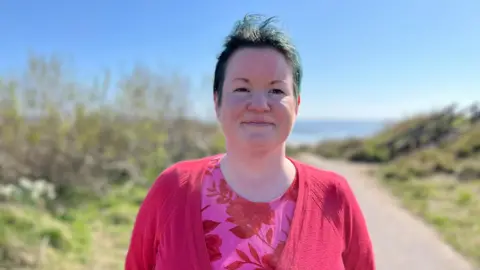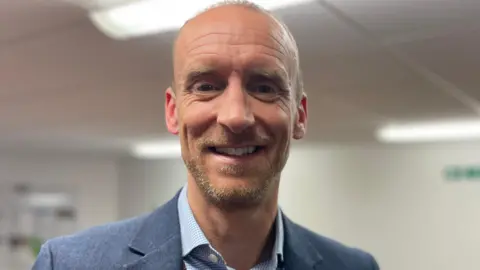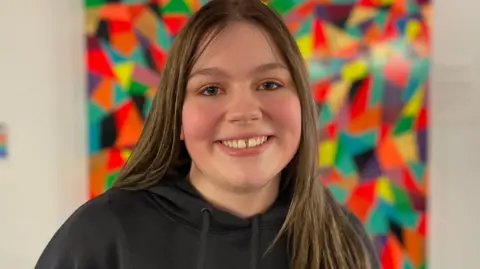Health producer
 Getty Images
Getty ImagesThousands of children are on “hidden” waiting lists for autism and ADHD assessments, experts have told the BBC.
This is despite the Scottish government hitting its waiting times target for young people’s mental health services for the first time last month.
The Royal College of Psychiatrists (RCPsych) said the number of children on separate lists waiting to be assessed for neurodevelopmental conditions is not routinely published and the Scottish government needs to be more transparent.
The Scottish government said long waits for neurodevelopmental support were unacceptable and it was increasing funding to improve access to services.
Child and Adolescent Mental Health Services (CAMHS) aims to help children with mental health problems which are causing a significant impact on their day-to-day lives, such as anxiety, depression, self-harm and eating disorders.
Last month, the latest official figures showed that 90% of young people had started treatment within 18 weeks of referral to CAMHS.
This was the first time the target had been reached since it was set more than a decade ago.
However, Dr Laura Sutherland, who is the vice chair of the RCPsych child & adolescent faculty, said children who are the most at risk are prioritised which can result in people with a neurodevelopmental condition waiting longer.
“Often there is not an immediate risk which is why some of these young people can wait for longer but I think overall the impact is longer term,” she said.
“It means young people can’t get into education or be supported adequately and ultimately some of these young people will go on to develop mental health conditions on the back of neurodiverse conditions.”

BBC Scotland News submitted Freedom of Information requests last year to try to gain an insight into the scale of waiting lists for young people looking for help with neurodevelopmental conditions.
NHS Greater Glasgow and Clyde said 7,560 children were waiting for a first appointment as of last spring, while for NHS Lothian the figure was 6,192 and for NHS Lanarkshire it was 8,571.
NHS Highland said 1,537 children were waiting for a neurodevelopmental assessment there.
However, not all health boards collect this data in the same way and it is not consistently published.
Dr Sutherland, who is also a consultant psychiatrist for CAMHS in Tayside, told the BBC the Scottish government should be more transparent about these “hidden waits”.
She said there should be ring-fenced funding for neurodevelopmental pathways to support vulnerable young people.
There are a number of routes for children to get a neurodevelopmental assessment.
The most common are for autism and ADHD.
Some children may be referred to paediatrics but many will initially go through CAMHS then be put on a neurodevelopmental waiting list.
It is the same specialist healthcare staff working with CAMHS, including psychiatrists, who carry out neurodevelopmental assessments and give diagnoses.
So there is competition for the resources which are already short-staffed.
There has been an increase in demand across the country in recent years.
In March, NHS Tayside stopped all new referrals for ADHD and autism to CAMHS due to increase demand for assessments.
Suzi Martin, from the National Autistic Society Scotland, said she was very concerned at the withdrawal of autism assessment services in some areas.
“Not only is diagnosis a validating and life-affirming experience for many, but families tell us that it can be extremely challenging, if not impossible, to get support without one,” she said.
Ms Martin said the society had been calling for more transparency on autism assessment waiting times for years and said they should be published, like they are in England.

The Salvesen Mindroom Centre, a charity that works with young people in Scotland who are neurodivergent, has seen a 295% increase in the number of people it supported last year compared to 2020.
Alan Thornburrow, the chief executive officer, said: “We can’t possibly respond to the levels of demand that are out there, it’s just impossible to service.”
He said there has been a huge increase in the prevalence in anxiety in the young people they support.

Rosie, 16, was referred to CAMHS when she was eight.
She was living with her grandparents who helped her get mental health support and she had her first appointment after waiting a year.
It took five years before she was diagnosed with autism.
“Getting that confirmation, it was quite emotional and I cried,” Rosie said.
“Then in the weeks following it just gave me a better understanding of myself.”
She said having an NHS autism diagnosis opened up access to a lot of support.
During Covid lockdowns Rosie struggled with her mental health, she became anxious when she left the house and stopped going to school.
She continued sessions with CAMHS but found there were long waits between appointments.
Through more regular one-to-one sessions with a support worker from Salvesen Mindroom Centre, Rosie said she worked on her anxiety and confidence and has returned to education this year.
“I’m more bubbly of a person. I wasn’t as smiley or as happy but she’s helped me come out of my shell,” she said.
Rising demand
There are a wide range of forms of neurodivergence including autism, dyslexia, dyspraxia, Tourette Syndrome or ADHD which can impact many aspects of life in different ways.
ADHD is characterised by difficulties with impulsivity, maintaining attention and restlessness while autism is associated with social communication difficulties, focused interests and repetitive behaviours.
Dr Sutherland said it is a positive step that children are being seen within the CAMHS target timeframe but warns that there can still be long waits for further treatment or between sessions because of staff shortages and rising demand.
“We are short of about 500 staff of all types – psychiatrists, psychologists, nursing staff – so it is very difficult to meet these targets,” she said.
The RCPsych said that referrals to CAMHS had gone up 3% in the past year, with a 500% increase in those referred for eating disorders.
A Scottish government spokesperson said: “We are clear that long waits for neurodevelopmental support are unacceptable and it is vital that children and families receive support and access to services that meet their needs at the earliest opportunity.
“In 2024-25 the Scottish government allocated £123.5m to NHS Boards to support increased access to mental health services – including Child and Adolescent Mental Health Services (CAMHS) and neurodevelopmental services, in addition to core funding allocations.
“Health boards continue to make good progress towards the target that 1% of frontline spend is made on CAHMS by the end of this Parliament. Latest data for 2023-24 shows spend has increased to 0.82% of total NHS expenditure.”

